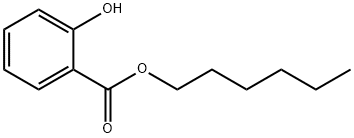A4723112
Hexyl acetate , Analysis of standard products, ≥99.5%(GC) , 142-92-7
Synonym(s):
Acetic acid hexyl ester;Capryl acetate;Hexyl acetate
CAS NO.:142-92-7
Empirical Formula: C8H16O2
Molecular Weight: 144.21
MDL number: MFCD00009524
EINECS: 205-572-7
Update time: 2022-07-08
PRODUCT Properties
| Melting point: | ?80 °C (lit.) |
| Boiling point: | 168-170 °C (lit.) |
| Density | 0.87 g/mL at 25 °C (lit.) |
| vapor pressure | 5 hPa (20 °C) |
| FEMA | 2565 | HEXYL ACETATE |
| refractive index | n |
| Flash point: | 99 °F |
| storage temp. | Store below +30°C. |
| solubility | 0.4g/l |
| form | Liquid |
| color | Clear colorless to pale yellow |
| Odor | at 10.00 % in dipropylene glycol. fruity green apple banana sweet |
| Odor Type | fruity |
| biological source | synthetic |
| Odor Threshold | 0.0018ppm |
| Water Solubility | immiscible |
| JECFA Number | 128 |
| BRN | 1747138 |
| Dielectric constant | 4.4199999999999999 |
| LogP | 3.3 at 30℃ |
| Surface tension | 26.75mN/m at 298.15K |
| CAS DataBase Reference | 142-92-7(CAS DataBase Reference) |
| NIST Chemistry Reference | Hexyl ethanoate(142-92-7) |
| EPA Substance Registry System | Acetic acid, hexyl ester (142-92-7) |
Description and Uses
Hexyl acetate has a pleasant fruity odor and bittersweet taste suggestive of pear. May be synthesized from n-hexyl alcohol and excess acetic anhydride at the boil or with an excess of acetic acid in the presence of concentrated sulfuric acid.
n-Hexyl acetate exhibits antimicrobial activity and can be used to improve the safety of minimally processed fruits. It is a fruity smelling fluid used as flavoring agent or in perfumes. It is a green leaf volatile from cabbage Brassica oleracea var. capitata L. It is used as plasticizers.
Safety
| Symbol(GHS) |   GHS02,GHS09 |
| Signal word | Warning |
| Hazard statements | H226-H411 |
| Precautionary statements | P210-P233-P240-P241-P242-P273 |
| Risk Statements | 10 |
| Safety Statements | 16 |
| RIDADR | UN 3272 3/PG 3 |
| WGK Germany | 1 |
| RTECS | AI0875000 |
| TSCA | Yes |
| HazardClass | 3 |
| PackingGroup | III |
| HS Code | 29153990 |
| Hazardous Substances Data | 142-92-7(Hazardous Substances Data) |
| Toxicity | LD50 orally in Rabbit: 36100 mg/kg LD50 dermal Rabbit > 5000 mg/kg |





